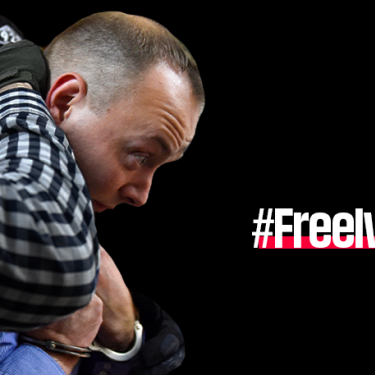Investigative reporter begins fourth year in Russian prison hell

As Russian investigative reporter Ivan Safronov begins his fourth year in jail, Reporters Without Borders (RSF) condemns the appalling physical and psychological mistreatment to which he and other detained journalists are often subjected by the Russian prison authorities and calls for their immediate release.
“To expect anything else from the Russian prison system would have been rather naive,” Ivan Safronov wrote on 18 June at the end of a letter about day-to-day life in a Russian prison that he had begun 17 days earlier.
After starting the letter, Safronov – who has been ill for nearly three years – was suddenly transferred to an isolation cell and then to a medical unit for unknown reasons. It was only on being returned to his regular cell that he was able to finish the letter, which was published by OVD-Info, an NGO that documents political persecution.
“When journalists such as Ivan Safronov are jailed in Russia, they are subjected to the full force of the violence and ill-treatment that afflict its prison system. Already deprived of their freedom for the simple fact of having dared to report the facts, some must also endure physical or psychological violence. We condemn this blind and never-ending persecution and call for the release of the 23 journalists held in Russian jails.
Sentenced to 22 years in prison for 'treason' in September 2022, after more than 2 years in pretrial detention and an unfair trial, Safronov is far from being the only Russian journalist to have his mental health put to the test in prison.
Igor Kuznetsov, the RusNews correspondent in Tomsk, has already spent more than 20 months in prison without being brought to trial. At the start of June, he was transferred to Moscow’s Serbsky psychiatric hospital, which was used in the Soviet era to “detect” mental illnesses in dissidents.
Maria Ponomarenko, a RusNews journalist who has been jailed for posting about the Russian army’s crimes in Ukraine, is being denied treatment for the terrible back pain she has been suffering. She is often manhandled and placed in solitary confinement, she describes in her letters the violence and lack of humanity with which her guards treat her. Rosderjava reporter Aleksandr Dorogov has repeatedly reported being beaten and humiliated.
In addition to the prison system’s routine brutality, violence is sometimes used to get journalists to confess publicly to imaginary crimes, as was the case with the Russian-Ukrainian reporter Vladislav Yesipenko, who was sentenced to six years in prison in February 2022. On 22 June, on the sole basis of testimony obtained under torture, a prosecutor requested 19 years'
